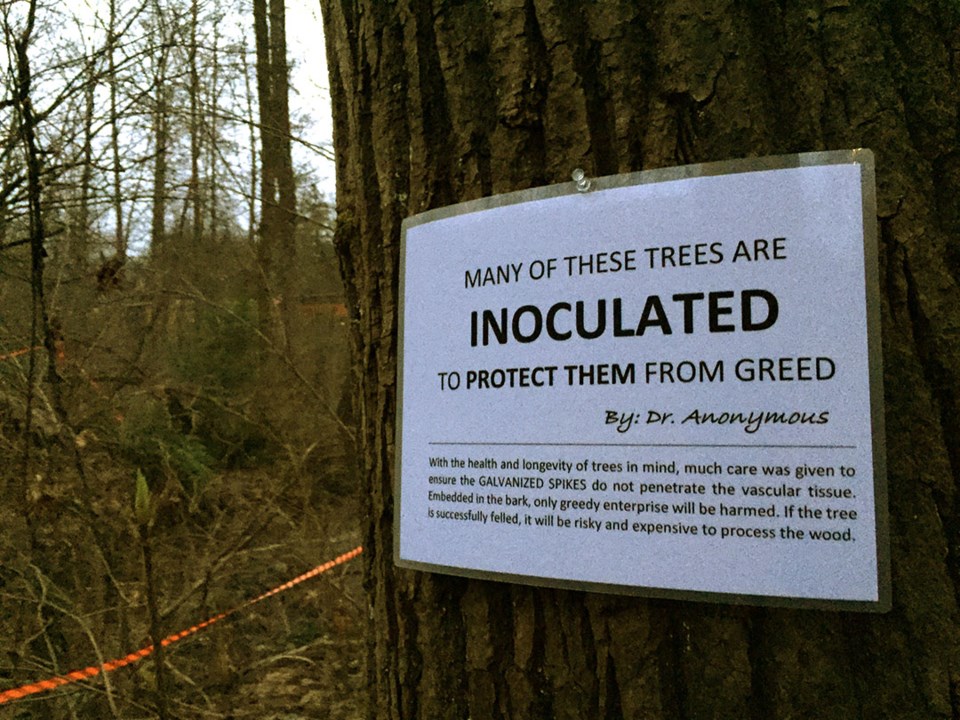In recent weeks, signs were covertly put up in the area of the now-cleared Holmes Creek protest camp near the Brunette River, where Trans Mountain is preparing to remove hundreds of trees to clear the path for the pipeline.
“Many of these trees are inoculated to protect them from greed,” the signs, signed by “Dr. Anonymous,” say. “With the health and longevity of trees in mind, much care was given to ensure the galvanized spikes do not penetrate the (trees’) vascular tissue. Embedded in the bark, only greedy enterprise will be harmed. If the tree is successfully felled, it will be risky and expensive to process the wood.”
Spiking trees is a tactic to protest deforestation, mostly used in cases of logging. In 1987, a mill worker in the U.S. was seriously injured after the saw he was using came into contact with a spike.
However, environmental groups have said the intention is not to harm people but to make processing trees more difficult for logging companies – hence the signs warning of the spikes.
No one has come forward in this case to take responsibility.
An organizer with Protect the Planet Stop TMX discovered the signs in recent days but said the group had nothing to do with the spikes or the signs.
“Last week, observers noted laminated signs tacked to trees and signed by Dr. Anonymous. It is unclear who will claim responsibility for the act, and environmentalists wonder if it might be TMX using tactics of slander,” Stop TMX said in a written statement.
The NOW has not seen any evidence to suggest Trans Mountain was involved in the spiking of trees.
In a brief email to the NOW, Trans Mountain didn’t comment on the spikes, only saying its priority is worker safety.
“Trans Mountain has protocols and safety measures in place to protect our workers and will take the necessary precautions to ensure this work can be carried out safely,” Trans Mountain said.
Trans Mountain was recently granted the ability to circumvent a section of the City of Burnaby’s tree bylaw, which requires a permit for anyone to damage or cut down any protected tree – those with 20.3-centimetre diameters or larger – in the city. However, the order, which came from the Canada Energy Regulator, said the project needed to comply with all other sections of the bylaw.
Trans Mountain plans to cut down 1,308 protected trees in Burnaby, not including trees with smaller trunks.
The Brunette River area has been the most recent front line in a dispute between Trans Mountain and anti-pipeline activists, who say the pipeline will make it impossible for Canada to meet its climate targets and removing the trees will disrupt a sensitive ecosystem around the river.
After Trans Mountain began clearing underbrush in the area, activists said last week they expect the confrontation to ramp up as workers move to clear the trees.
A demonstrator is still occupying a tree in the Lost Creek area, the site of the newer tree occupation after Trans Mountain cleared the original Holmes Creek occupation in December.
“We will keep coming back,” said Timothée Govare, the current occupier of the tree. “Our commitment to delay or cancel construction of this project is unshakable.”
Christine Thuring, an ecologist and organizer with Stop TMX, said the construction could disrupt the local population of Vancouver’s official bird, the Anna’s hummingbird.
“We know that these birds start nesting in December, so cutting shrubbery right now does not bode well for this species,” Thuring said in a news release.
Follow Dustin on Twitter: @dustinrgodfrey
Send him an email: [email protected]


